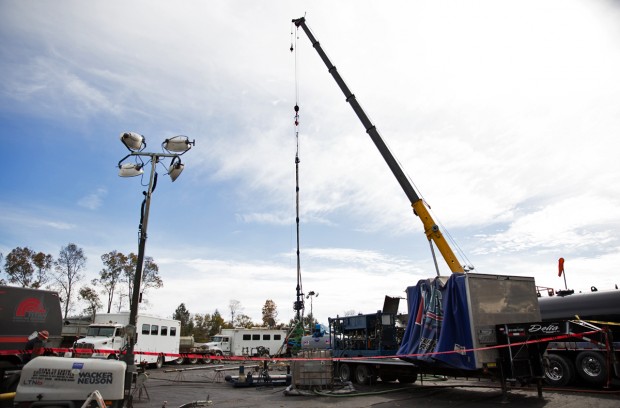Gas drilling impact fee revenue up 11 percent this year

Lindsay Lazarski / WHYY
The state expects to bring in $224.5 million in impact fee revenue from natural gas drillers this year.
Pennsylvania expects to collect $224.5 million in impact fees levied on natural gas drilling companies this year– an 11 percent increase over the amount collected last year.
The state’s 2012 oil and gas law, Act 13, charges drillers for each well. The fee can range from $40,000 to $60,000 per well, depending on the price of natural gas.
This year, drillers paid $50,000 for new horizontal wells– up from $45,000 last year because the price of gas increased. Smaller, vertical wells paid $10,000.
The state Public Utility Commission (PUC) is charged with collecting and distributing the fee. Spokeswoman Jennifer Kocher says there were approximately 1,200 new wells drilled in 2013.
“The vast majority of the wells were horizontal wells,” she says.
Range Resources paid the most this year ($27,992,000) followed by Chesapeake Energy ($26,727,950) and Shell ($17,004,450).
The fee declines over time and drillers continue to pay for 15 years.
Governor Corbett issued a statement noting the success of the law, which has brought in $630 million to the state so far.
“We are building a stronger Pennsylvania by harnessing our abundant resources to create jobs for working families, reinvest in our local communities, and protect our environment for generations to come,” Corbett said.
Approximately $25 million stays at the state level and goes to agencies impacted by the natural gas boom, like the state Department of Environmental Protection.
Of the remaining revenue, 60 percent goes back to local governments hosting drilling operations, and 40 percent goes to the Marcellus Legacy Fund, which is disbursed to municipalities throughout the state for environmental and infrastructure projects.
The Pennsylvania division of the American Petroleum Industry touted the amount of money drillers are spending in the state.
“The oil and natural gas industry is investing in communities, providing new revenue for the government and delivering a long-term path to new jobs for Pennsylvania workers,” said executive director Stephanie Catarino Wissman in a statement.
A recent analysis by the state’s Independent Fiscal Office found Pennsylvania has one of the lowest effect tax rates on natural gas production in the country. The report compared Pennsylvania’s impact fee against the more common severance taxes in other states, which are based on gas production volumes.
The analysis was criticized by the Corbett administration and the gas industry for excluding certain types of taxes, including corporate income tax.
The impact fee has already become an issue in the current race for governor. Corbett’s Democratic challengers have called for various severance taxes on gas production, which many have vowed to spend on public education.
Corbett has said the current fee structure is best because it keeps much of the money at the local level for communities dealing with the impacts of drilling operations.
Municipalities are required to report how they spent last year’s impact fee money to the PUC by April 15.
Here’s how much each company paid:
[spreadsheet key=”0AuY1xHD_PDzBdGszdFY1V0RYbWJqOEJPVGl2eC1hbnc” source=””sheet=0 filter=0 paginate=1 sortable=1]
Source: Pennsylvania Public Utility Commission
















